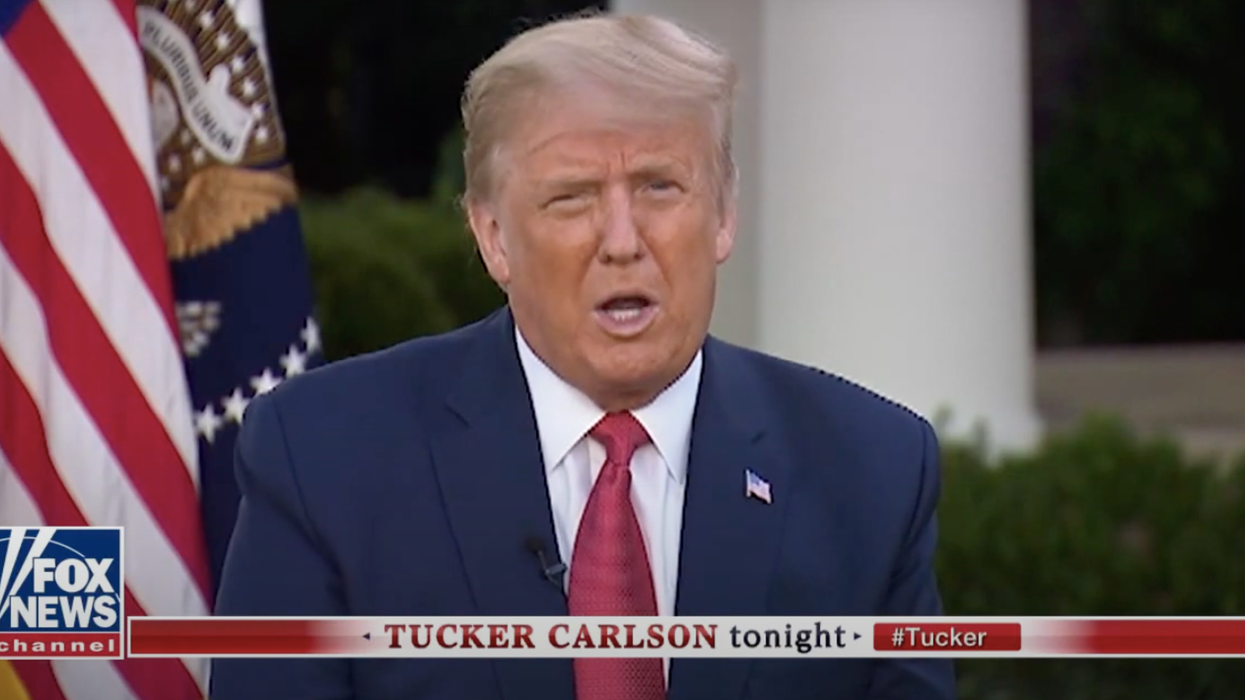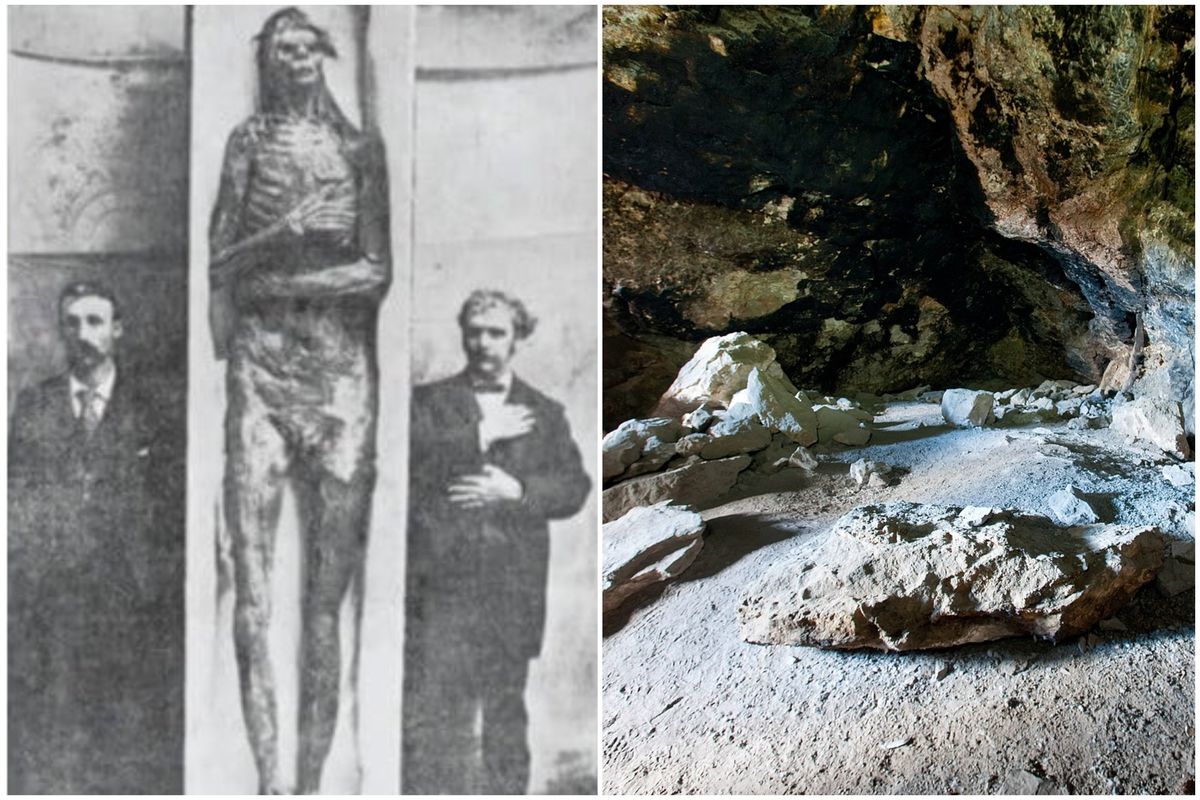News
Greg Evans
Oct 10, 2020
Donald Trump has taken part in his first on-camera interview since he tested positive for coronavirus over a week ago.
The president spent a short time in hospital before returning to the White House on Monday but there has been no further update on his condition, despite Trump claiming that he is feeling better.
Trump spoke to Dr. Mark Siegel on Fox News' Tucker Carlson Tonight show in what was billed as a live TV 'medical evaluation'. In reality, this was nothing more than a straight-forward interview for the president.
That being said, Trump did look a lot healthier than he has in recent days but there will still plenty of strange moments throughout the interview in relation to Trump's diagnosis and whether he still has Covid-19 or not.
In typical doctor-patient dialogue, Siegel began the interview by asking Trump how he is feeling. The president replied in his typical resilient fashion but also used some casual racism:
I'm feeling really good. I'm feeling really strong. I know a lot of people who have had the Covid or the 'China virus' as I like to call it because it came from China. I feel really, really strong and a lot of people don't feel that way sometimes, for a while, afterwards but very good.
When asked about what symptoms he had when he first tested positive for the virus, Trump claims that he "didn't feel strong' but 'didn't have any trouble breathing" either and "didn't feel how the president of the US should feel."
Bizarrely, Siegel then reveals to Trump "confidentially" that his patients never listen to him and follows that by asking Trump if he tried to 'negotiate' with the doctors at the Walter Reed medical centre. Trump said that he did try to 'negotiate' but that he ultimately respects the doctor and their expertise but he generally wouldn't listen.
I did negotiate but I have a lot of respect for these doctors, they are the best doctors in the world. Walter Reed - I've seen the work they do in the military, people coming in so badly injured like you've never seen before - I have a lot of respect. I really tended to listen but I generally maybe I wouldn't but I did tend to listen to this group.
Siegel then moves on to ask Trump how he was feeling while he was in the hospital and the president claims that the 'lack of energy' really got to him because his life is 'based on energy.'
It's just that you were tired. You know - it was just getting to you from the standpoint that you didn't have that same energy level and my life is based a little on energy and you didn't have it. I don't know. It could have led to bad things from that point. I don't know. I got lucky with the certain medicine. It really was something, I took a certain medicine that was miraculous to me, I don't think it's just in the head I really believe it worked.
Trump was then asked if he was scared when he first arrived at the hospital but rather than answer the question he instead reveals that the mystery drug that he just mentioned was called 'Regeneron.'
Continuing to talk about Regeneron, Trump claims that he is talking about sending the transfusion to "everybody that's got the problem."
I'd like to send it to everybody. In fact, as I said I'm going to send it to everybody that's got the problem and we are going to send it free of charge. Including seniors, of course, but we are going to send it to everybody.
Trump then claims that he wanted to leave the hospital just a day after he arrived there.
They wanted to keep me for observation and make sure I was good. I was there for three and a half days, they wanted to keep me - I wanted to leave after the first day. I really felt I was in not had shape after the first day. I think I would've been in much worse shape had I not taken this medication.
After Siegel asks him how long the doctors wanted to keep him for, Trump reveals that he is no longer taking medication for Covid-19 as of "eight hours ago" which makes him feel good as he "doesn't like medication."
Siegel then asks Trump about some of the tests that he underwent in hospital, which Trump explains but seems more fascinated by the equipment that they had there which he had "never seen before."
They tested the lungs. They have incredible equipment at the Walter Reed - in fact, they said 'no you can leave your jacket on.' That's the first that's ever happened. Leave your shirt on, leave your jacket on. I said 'I'll take it off anyway if you want.' They checked the lungs, they tested with different machinery, they have incredible stuff I've never seen before. It tested good, initially, they had some congestion in there but it tested ultimately - it tested good and with each day it got better.
Next, Trump was asked about his controversial drive-by to wave at his supporters that had gathered outside of the facility, despite the fact that the members of the secret service in the car with the president could have come in danger of contracting Covid-19. Trump claims that the agents 'had no problem' with this stunt.
Trump is then asked about the 'lessons he has learned' from this pandemic and his own fight against the virus. The president says that it was "important that he acted early" and that he can't be "somebody who just hides in a basement because he's running the greatest country in the world."
Siegel then explains that he has given some of his patient's dexamethasone and how it has helped them against the virus. He then asks Trump what he is taking now but the president seems confused as to whether he is taking anything or not, which contradicts what he said just moments ago about now being 'medication free.'
Trump then declares, with a chuckle, that he is prepared to donate his own plasma.
I will, nobody asked me that question but I will if they want me to do it. I'd love to do it.
The strangest moment of the interview came when Siegel asked Trump whether he has been tested again. Trump said that he had but was coy on revealing the results saying "I'm at either the bottom of the scale or free."
The conversation then moves to the topic of the next presidential debate with Joe Biden, which has no been cancelled as Trump refused to do it virtually. Siegel asks Trump if he would be prepared to debate Biden outside on Miami Beach. Trump said that he would, citing that he's had no problems at his rallies before spreading a conspiracy theory about Biden.
I'd have no trouble with it at all. In fact, when we've had rallies. outside we've had no problem whatsoever. Outside is better than inside as you probably no with this crazy thing that's gone on. I would have no problem with it. We've always had a problem with this commission. This commission is ridiculous quite frankly. Who wants to do a debate on a computer? I don't. You've gotta be there. We did great in the last debate. You've gotta be there, you've gotta see the person. You can't do that on a computer. Besides that, Joe has a tendency to get the answers and read them off the computer when he's asked questions.
Trump is asked where he thinks he contracted the virus from but admits that he doesn't know and despite the entire planet living with Covid-19 for the best part of a year now, he finally seems to realise just how contagious it is.
They had some big events at the White House. Perhaps there. Nobody really knows for sure. Numerous people have contracted it. People all over the world have contracted it. It's highly contagious. That's what thing you learn, this is a contagious disease and generally you get better from it but we also now have medicines that will help a lot.
Trump adds to this by saying that "the cure is worse than the problem itself."
I hope they open schools, some of the states are closed and the cure is worse than the problem itself in many cases - it's as terrible thing.
Siegel closes the interview by calling Trump's recovery "inspiring" to which the president replies by again pointing the blame at China adding "maybe at some point I'll be able to report exactly why it came to us."
And with that Trump's first on-screen television interview since testing positive for coronavirus was in the books.
Top 100
The Conversation (0)














